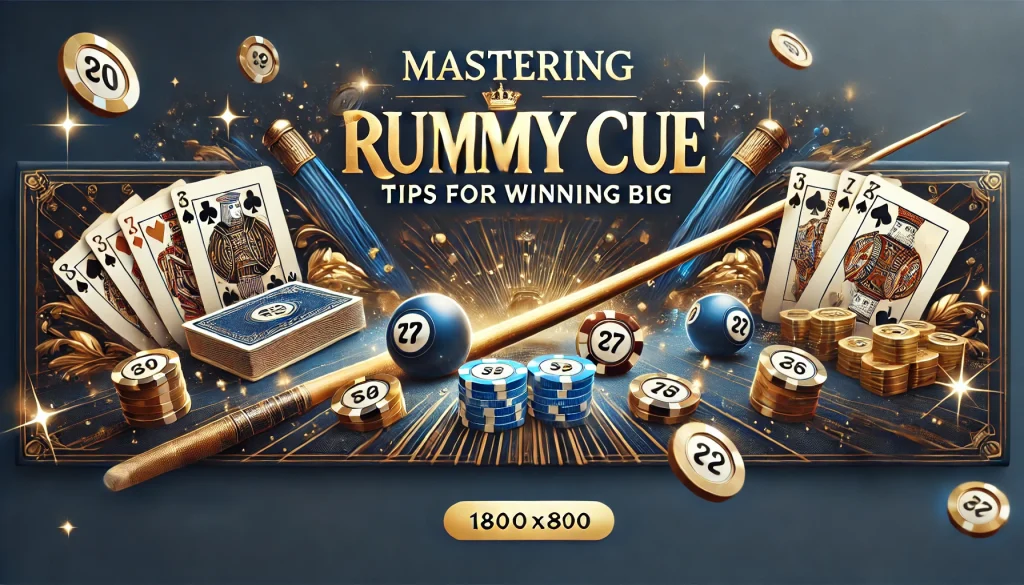
Mastering Rummy: A Complete Guide For generations, players have been enthralled with the timeless card game of rummy. Both casual & competitive players like it because of its unique combination of skill, strategy, and a little bit of luck. Rummy requires not only an understanding of the rules but also the ability to recognize important card combinations, manage one’s hand effectively, and create effective strategies. This post will explore the nuances of rummy and offer advice & strategies to improve your play. Fundamentally, Rummy is a card game in which players form sets and runs from a hand of cards. Merging cards into legitimate combinations—which can be runs (three or more consecutive cards of the same suit) or sets (three or four cards of the same rank)—is the fundamental goal.
A certain number of cards are dealt to each player, and the remaining cards are arranged in a draw pile. The discard pile is started with one card face-up. In an effort to strengthen their hand, players alternately draw from either pile and discard a card.
When a player declares “Rummy” and successfully melds all of their cards, they win points based on the cards that are still in their opponents’ hands. For any player hoping to get better at the game, it is essential to comprehend the subtleties of the rules. There are several variations of rummy, each with its own set of guidelines and methods for scoring.
In Gin Rummy, for example, players try to minimize the value of unmelded cards while forming their hands into valid combinations. In Indian Rummy, on the other hand, players must create a minimum of two sequences, one of which needs to be pure (i.e., devoid of a joker). Making yourself familiar with these variations can have a big impact on your game play and strategy. formulating a comprehensive plan. A well-rounded strategy that incorporates both offensive & defensive play is essential for a successful Rummy player. A player’s offensive strategy should concentrate on forming melds as fast as possible while monitoring possible combinations that could be made with the cards they draw.
This entails predicting which cards your opponents might require in addition to identifying which cards are advantageous for your hand. Developing Melds and Predicting the Moves of Opponents are key components of offensive play. You will then be able to decide which cards to keep and which to throw away. By using a strategic approach, you can stay ahead of your opponents and create opportunities for meld formation.
Playing defense means keeping an eye on your opponent’s movements. Keeping an eye on the cards your opponents are picking up and discarding is crucial for defensive play. It might be a sign that an opponent is attempting to create a particular meld if you observe that they routinely select particular cards from the discard pile.
Holding onto cards that could finish their sets or runs in these situations could be a smart move to stop them in their tracks. The Strategy of Balancing for Achievement. You will increase your chances of winning and become a strong opponent at the table if you can balance the offensive and defensive components of your strategy. The ability to identify important card combinations that can result in successful melds is one of the most important rummy skills.
During gameplay, players can make quicker decisions if they are familiar with common sets and sequences. When drawing or discarding cards, for instance, knowing that a sequence like 4-5-6 of hearts is a valid run can help you make decisions. Also, your strategy may be impacted by knowing that high-value cards can form sets, such as three Kings or three Aces. Players should also be aware that they might be holding wild cards or jokers. These cards are very useful for finishing melds because they can be used in place of any other card. But it’s important to use them sparingly because if you don’t form a meld before your opponents do, you risk missing out on opportunities if you hold onto a joker for too long.
Gaining proficiency in identifying these crucial combinations & knowing when to use wild cards will greatly increase your chances of winning at rummy. In Rummy, the discard pile is frequently disregarded by inexperienced players, but for those who know how to use it wisely, it can be a goldmine of strategic opportunities. Every time a player discards a card, they reveal important details about their hand and possible goals.
You can learn about your opponents’ tactics and modify your own by paying close attention to the discard pile. For example, it might be a sign that an opponent is working on a run involving those cards if they discard a 7 of diamonds after collecting a 6 and an 8 of diamonds. Another effective strategy is to deliberately discard your own cards. Consider holding onto your card longer or discarding less important cards if you think your opponents might need it, like a card that completes their possible meld. This keeps your opponents guessing about your intentions in addition to protecting your hand.
You can transform what appears to be a straightforward element of the game into a tactical advantage by becoming proficient at using discards. Because it directly affects your ability to form melds and win the game, effective hand management is essential in rummy. Sorting your cards into possible runs and sets as soon as you get them is a good strategy. Because of this mental organization, you can rapidly determine which cards are necessary to finish your melds and which ones can be thrown away with little to no loss. You can simplify your gameplay by giving priority to a card while discarding others if, for instance, you have multiple cards in sequence but are missing one essential card to finish a run.
As the game goes on, adapting your strategy is a crucial component of hand management. You might need to modify your original plans in light of the changing game dynamics as you draw new cards and watch what your opponents do. This flexibility may be the difference between winning and losing; if the game takes an unexpected turn, holding onto a card for too long because it once appeared valuable may result in missed opportunities. Your overall effectiveness in rummy will increase if you continue to manage your hand in an orderly but adaptable manner. In rummy, read your opponents. In Rummy, paying attention to your opponent’s moves is equally as crucial as paying attention to your own hand.
Critical information about their tactics and goals can be gleaned by observing how they draw from the pile or what they decide to discard. For example, it might be a sign that an opponent is aiming for particular melds if they routinely select particular suits or ranks from the discard pile. Finding trends and modifying your approach. You can effectively counter their moves by modifying your own strategy if you identify these patterns early on.
Also, observing the timing of your opponents’ plays can give you insight into how confident they are with their hands. It could indicate that an opponent is either confident in their current melds or is attempting to deceive others about the strength of their hand if they discard high-value cards early in the game. In Rummy, timing and decision-making are crucial. However, if they keep some cards for a long time before throwing them away, it might mean that they are waiting for certain combinations to appear. You can learn important information that will guide your decisions throughout the game by closely monitoring these behaviors. Knowing when to give up a round or put everything on the line to win is one of the most important decisions in rummy.
Dropping out with a weak hand might seem like a simple decision, but you should think about the points you might lose if someone else leaves before you. Instead of risking accruing points against you, it might be prudent to drop early if you find yourself holding onto multiple high-value unmelded cards as other players are almost finished with their hands. However, going for the win necessitates carefully weighing the strength and improvement potential of your current hand. Weighing the benefits and risks becomes essential if you have multiple promising combinations but are still lacking important cards.
Occasionally, taking measured chances can yield significant rewards; however, if you keep failing because you are overextending your hand’s capabilities, it might be time to reconsider your strategy. Long-term success in rummy depends on finding this balance between prudence and ambition. Rummy requires commitment and practice to get better at, just like any other skill-based game. Playing with different opponents on a regular basis can expose you to a variety of tactics and play styles that will improve your comprehension of the game. Joining neighborhood clubs or online forums is another option if you want to interact with other rummy fans who share your enthusiasm.
These exchanges not only offer priceless experience but also strengthen bonds between players who value the subtleties of this classic game. Reading books or using internet resources to study rummy strategies can also help you improve your knowledge and abilities. A lot of seasoned gamers share their knowledge in videos or articles that discuss sophisticated strategies and the psychological effects of gaming. You will progressively gain a deeper comprehension of the intricacies of Rummy by immersing yourself in these resources and putting what you have learned during practice sessions into practice. You will ultimately improve your gameplay & raise your chances of winning at the table by combining regular practice with continuing education.
In summary, learning to play rummy is only one aspect of mastering the game; other skills include strategic thinking, acute observation, and constant practice & study. You can establish yourself as a strong player in this captivating card game by fully comprehending the rules, creating strategies that work, identifying important card combinations, effectively managing your hand, monitoring the movements of your opponents, determining when to drop or go for the win, and making a commitment to continuous skill improvement. These tips will definitely increase your enjoyment and success in rummy, whether you’re playing with friends or competing in more competitive settings.




